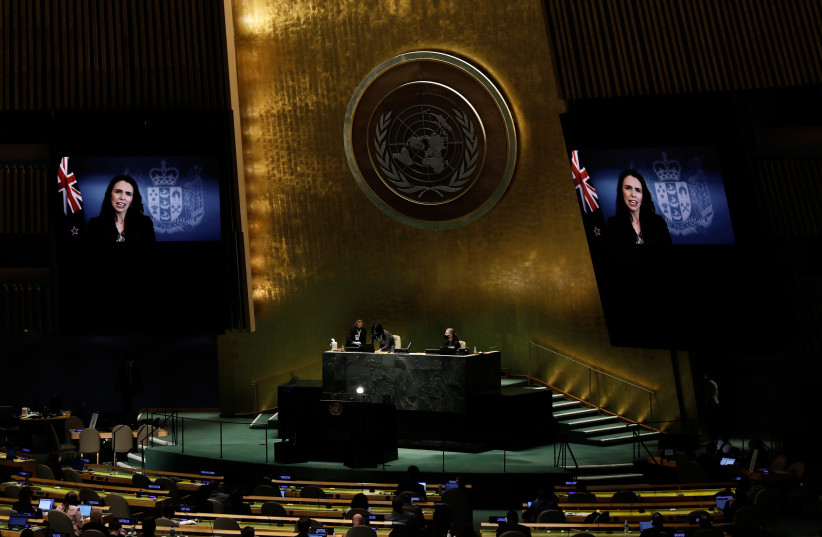Over 100 human rights and civil society organizations in Yemen signed a joint petition urging the United Nations and the international community to demand the release of four Yemeni YouTube influencers who were detained after criticizing the Houthi militia, Arab News reported. While these efforts are not likely to achieve their goal of releasing the influencers, experts believe that the arrest of such popular figures might backfire.
For more stories from The Media Line go to themedialine.org
The civil war in Yemen started in 2014 when the Iranian-backed Houthi insurgent group took control of the country’s capital, Sanaa, and in January 2015 forced President Abed Rabbo Mansour Hadi to resign. A month later, Hadi rescinded his resignation and, in March 2015, a Saudi-led coalition intervened against the Houthis. The control over the country remains divided between the Saudi-backed government and the Houthi movement. A six-month, UN-brokered successful truce ended in October after the sides failed to renew it through negotiations.
Ahmed Hajar, a YouTuber from Sanaa, was the first one of these influencers to be abducted, in late December, after he posted a video on his YouTube channel criticizing the Iranian-backed militia for failing to relieve poverty, raising taxes, and allowing corruption among its ranks.
A few days later, three additional influencers, Mustafa Al-Mumari, Hamoud Al-Mesbahi and Ahmed Elaw, were abducted as well after they all released videos supporting Hajar and condemning his arrest. Al-Mumari has over 2 million subscribers on YouTube.
Joint statement to the UN

The joint statement urging the UN to demand their release said: “Civil society organizations in Yemen are closely monitoring the Houthi militia’s frantic and hysterical campaigns against journalists and social media influencers who have merely voiced their opposition to the machine of corruption and looting that has devoured everything and left the population suffering from the scourge of poverty and hunger.”
Despite the NGOs' collective effort to pressure the Houthis to release the social media influencers, Hannah Porter, an independent consultant on Yemen affairs, says that it is unlikely the petition alone will prompt the Houthis to release them.
"There are many examples of activists and journalists being detained by the Houthis and various petitions that call for their release that do not always lead to results," she told The Media Line.
However, she said that the alternative, which is "ignoring these abuses and not calling for the release of detainees, would be unacceptable."
She points out that while condemnation is important, one must realize that the Houthis are unlikely to release prisoners unless they feel that is in their own interest.
The UN does not have the upper hand
Sana Tariq, a research fellow for the Center for Conflict and Humanitarian Studies in Doha, Qatar, told The Media Line that the United Nations, which is called on by the petition to demand the release of the detainees, is not in a position to apply much pressure on the Houthis given the narrow space it currently has to conduct its own humanitarian and peace mediation work within Houthi territory.
"These detentions are simply the latest in a very pervasive and alarming pattern of violent Houthi repression, despite repeated UN calls to end the abuses," she added.
A human rights activist in Sanaa who spoke with The Media Line called the effort of signing petitions to demand the release of detainees "useless with the Houthi authority."
She added that the Houthi militia does not accept criticism, especially from influencers and those with large fan bases.
Porter says, however, that arresting the influencers might backfire on the Houthis.
These influencers are widely beloved media figures, she pointed out. "It is difficult to see how their detention would do anything other than incite anger among Yemenis, even those who tend to support the Houthis," said Porter.
As seen in other countries, "the crackdown on free speech and expression by authoritarian governments may temporarily suppress dissent, but it can also lead to increased public criticism or protest," she said, adding that it remains to be seen how this will play out in Yemen.
Tariq adds that, since the warring sides in Yemen failed to renew the cease-fire that expired in October, activists may now be more at risk due to harsher Houthi responses to criticism.
That is why Porter says that support for the Houthis within the territory they control is difficult to measure precisely.
Additionally, she notes that, on one hand there are Yemenis who see the Houthis as their best defense against Saudi aggression and, on the other hand, "these Yemenis are suffering from increased repression and exploitation by the Houthis."
Nevertheless, she points out, "while many Yemenis obviously oppose these practices, that does not mean that they are willing to be openly critical." She added that most critics of the Houthis living in Houthi-controlled areas have to keep their identities anonymous or face the possibility of imprisonment.
The Yemeni activist that spoke to The Media Line said that the civilians arrested by the Houthis for their criticism or even alleged criticism "are arrested and jailed in security and intelligence prisons without allowing their families to visit them." Most of these prisoners are held in very poor conditions and subjected to "mock trials," and sometimes sentenced to death "after issuing sentences that lack the minimum level of legal procedures," the activist noted.
